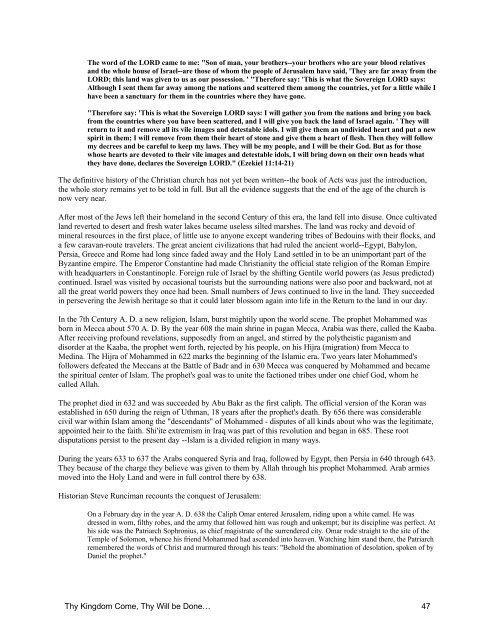Free End Times Book (pdf).. - Rapture Notes
Free End Times Book (pdf).. - Rapture Notes
Free End Times Book (pdf).. - Rapture Notes
You also want an ePaper? Increase the reach of your titles
YUMPU automatically turns print PDFs into web optimized ePapers that Google loves.
The word of the LORD came to me: "Son of man, your brothers--your brothers who are your blood relatives<br />
and the whole house of Israel--are those of whom the people of Jerusalem have said, 'They are far away from the<br />
LORD; this land was given to us as our possession. ' "Therefore say: 'This is what the Sovereign LORD says:<br />
Although I sent them far away among the nations and scattered them among the countries, yet for a little while I<br />
have been a sanctuary for them in the countries where they have gone.<br />
"Therefore say: 'This is what the Sovereign LORD says: I will gather you from the nations and bring you back<br />
from the countries where you have been scattered, and I will give you back the land of Israel again. ' They will<br />
return to it and remove all its vile images and detestable idols. I will give them an undivided heart and put a new<br />
spirit in them; I will remove from them their heart of stone and give them a heart of flesh. Then they will follow<br />
my decrees and be careful to keep my laws. They will be my people, and I will be their God. But as for those<br />
whose hearts are devoted to their vile images and detestable idols, I will bring down on their own heads what<br />
they have done, declares the Sovereign LORD." (Ezekiel 11:14-21)<br />
The definitive history of the Christian church has not yet been written--the book of Acts was just the introduction,<br />
the whole story remains yet to be told in full. But all the evidence suggests that the end of the age of the church is<br />
now very near.<br />
After most of the Jews left their homeland in the second Century of this era, the land fell into disuse. Once cultivated<br />
land reverted to desert and fresh water lakes became useless silted marshes. The land was rocky and devoid of<br />
mineral resources in the first place, of little use to anyone except wandering tribes of Bedouins with their flocks, and<br />
a few caravan-route travelers. The great ancient civilizations that had ruled the ancient world--Egypt, Babylon,<br />
Persia, Greece and Rome had long since faded away and the Holy Land settled in to be an unimportant part of the<br />
Byzantine empire. The Emperor Constantine had made Christianity the official state religion of the Roman Empire<br />
with headquarters in Constantinople. Foreign rule of Israel by the shifting Gentile world powers (as Jesus predicted)<br />
continued. Israel was visited by occasional tourists but the surrounding nations were also poor and backward, not at<br />
all the great world powers they once had been. Small numbers of Jews continued to live in the land. They succeeded<br />
in persevering the Jewish heritage so that it could later blossom again into life in the Return to the land in our day.<br />
In the 7th Century A. D. a new religion, Islam, burst mightily upon the world scene. The prophet Mohammed was<br />
born in Mecca about 570 A. D. By the year 608 the main shrine in pagan Mecca, Arabia was there, called the Kaaba.<br />
After receiving profound revelations, supposedly from an angel, and stirred by the polytheistic paganism and<br />
disorder at the Kaaba, the prophet went forth, rejected by his people, on his Hijra (migration) from Mecca to<br />
Medina. The Hijra of Mohammed in 622 marks the beginning of the Islamic era. Two years later Mohammed's<br />
followers defeated the Meccans at the Battle of Badr and in 630 Mecca was conquered by Mohammed and became<br />
the spiritual center of Islam. The prophet's goal was to unite the factioned tribes under one chief God, whom he<br />
called Allah.<br />
The prophet died in 632 and was succeeded by Abu Bakr as the first caliph. The official version of the Koran was<br />
established in 650 during the reign of Uthman, 18 years after the prophet's death. By 656 there was considerable<br />
civil war within Islam among the "descendants" of Mohammed - disputes of all kinds about who was the legitimate,<br />
appointed heir to the faith. Shi'ite extremism in Iraq was part of this revolution and began in 685. These root<br />
disputations persist to the present day --Islam is a divided religion in many ways.<br />
During the years 633 to 637 the Arabs conquered Syria and Iraq, followed by Egypt, then Persia in 640 through 643.<br />
They because of the charge they believe was given to them by Allah through his prophet Mohammed. Arab armies<br />
moved into the Holy Land and were in full control there by 638.<br />
Historian Steve Runciman recounts the conquest of Jerusalem:<br />
On a February day in the year A. D. 638 the Caliph Omar entered Jerusalem, riding upon a white camel. He was<br />
dressed in worn, filthy robes, and the army that followed him was rough and unkempt; but its discipline was perfect. At<br />
his side was the Patriarch Sophronius, as chief magistrate of the surrendered city. Omar rode straight to the site of the<br />
Temple of Solomon, whence his friend Mohammed had ascended into heaven. Watching him stand there, the Patriarch<br />
remembered the words of Christ and murmured through his tears: "Behold the abomination of desolation, spoken of by<br />
Daniel the prophet."<br />
Thy Kingdom Come, Thy Will be Done… 47



